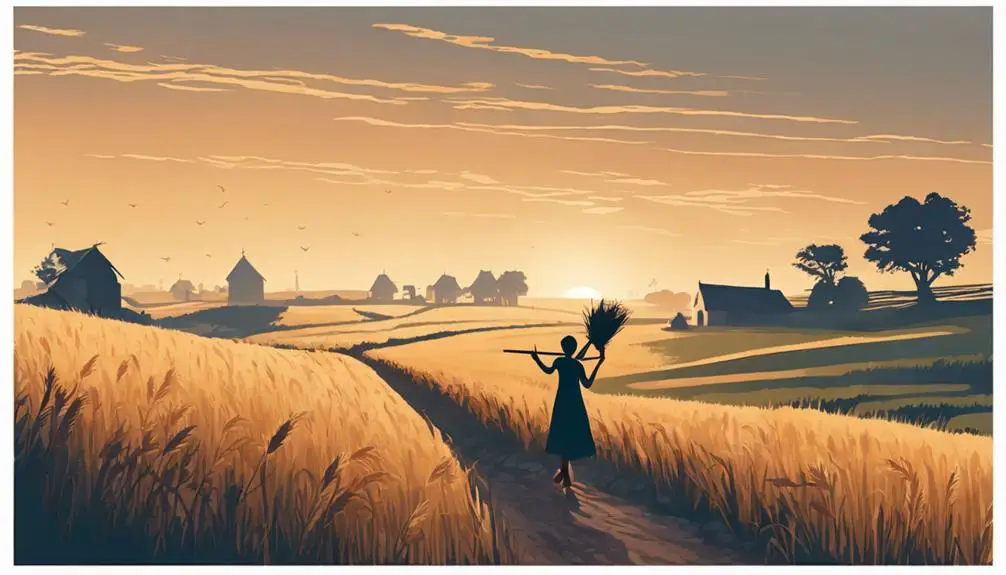Discover captivating Bible books for women, each weaving tales of strength and wisdom that speak directly to the heart, inviting deeper exploration.

Books in the Bible for Women
Navigating the Bible as a woman can feel like uncovering hidden gems in an ancient tapestry, each book weaving its own unique pattern of wisdom, courage, and hope. You'll find the Book of Ruth empowers through loyalty and resilience, while Proverbs offers timeless wisdom specifically tailored for you.
Esther's narrative will inspire with its tale of bravery, and the Letters to the Philippians can uplift your spirit. Then there's Mary's profound journey in Luke, and the comforting Psalms that speak directly to the heart. These books hold more than just stories; they offer a perspective that resonates deeply with women's experiences across ages.
Aren't you curious to uncover what personal revelations they might hold for you?
Key Takeaways
- The Book of Ruth and Esther's story highlight women's empowerment through resilience, courage, and faith.
- Proverbs and Philippians provide practical wisdom and guidance for women's daily lives and spiritual growth.
- Mary's narratives in Luke demonstrate the significance of faith and divine encounters in women's lives.
- Psalms offer comfort and hope, reinforcing the importance of spiritual resilience and divine consolation for women.
The Empowering Book of Ruth

Delving into the Book of Ruth, you'll find a narrative that not only empowers women but also profoundly challenges societal norms and expectations of its time. At its core, the book presents Ruth's loyalty, an attribute that becomes a beacon of unwavering commitment amidst dire circumstances. This loyalty isn't a passive trait but a dynamic force that propels Ruth into actions that eventually lead to her redemption and that of her mother-in-law, Naomi.
Analyzing Ruth's loyalty, you'll observe it's not merely to Naomi but also to the broader sense of duty and love. Her decision to stay with Naomi, encapsulated in the famous declaration, 'Where you go, I'll go,' defies the expected return to her homeland after the death of her husband. This choice signifies a break from the traditional roles assigned to women, showcasing Ruth as a figure of agency and resilience.
Furthermore, the harvest's significance in the narrative can't be overstressed. The harvest season provides not only the backdrop for Ruth's loyalty to manifest through her hard work and dedication but also symbolizes the themes of renewal and hope. Ruth's gleaning in the fields, permitted by Levitical laws to support the poor and the foreigner, highlights her industrious nature and the providential care she receives, leading to her eventual marriage to Boaz. This marriage elevates her status and secures her future, illustrating the transformative power of loyalty and hard work.
Thus, the Book of Ruth offers a nuanced examination of loyalty and the significance of harvest, presenting a compelling narrative of female empowerment and societal change.
Proverbs: Wisdom for Women

In the heart of the Book of Proverbs, women find a treasure trove of wisdom that speaks directly to the complexities and challenges of their lives. This ancient text, rich in metaphor and meaning, offers not just moral guidance but practical applications for everyday living. Its passages, dense with advice on character building, navigate through the virtues and vices that sculpt personal and communal life.
Delving deeper, Proverbs places a significant emphasis on wisdom as a feminine entity, portraying it not just as an abstract concept but as a guiding principle integral to a woman's life. The text encourages women to embody wisdom, portraying it as more precious than jewels, and its pursuit as essential to a life well-lived. This portrayal isn't just symbolic but carries practical implications for daily living, from managing a household to making ethical decisions.
Moreover, the emphasis on character building in Proverbs can't be overstated. It meticulously details the attributes of a virtuous woman, highlighting diligence, kindness, and fear of the Lord as cornerstone virtues. These qualities aren't presented as ideals unattainable but as achievable benchmarks for personal development. The text encourages women to cultivate these virtues, promising them not only personal fulfillment but also respect and esteem within their communities.
In essence, Proverbs offers a blueprint for living that transcends generations. Its teachings on wisdom, character building, and practical applications remain as relevant today as they were millennia ago, providing women with timeless guidance for navigating the complexities of life.
Esther's Story of Courage

Esther's narrative stands as a compelling testament to the power of courage and faith in the face of daunting odds. Her story, deeply embedded within the Hebrew Bible, unfolds in a context rich with royal beauty and political intrigue, marking her as an unparalleled figure among biblical women. You'll find that Esther's journey from an ordinary Jewish girl to the queen of Persia isn't merely a tale of ascension but a profound exploration of identity and duty amidst a complex web of political machinations.
Central to Esther's story is her remarkable bravery, which emerges most vividly when she risks her life to save her people from annihilation. This act of courage isn't impulsive but a calculated response to the political intrigue that characterizes her environment. The narrative meticulously details how Esther navigates the perilous corridors of power, leveraging her royal beauty and strategic acumen to influence King Xerxes. It's a testament to her wisdom and foresight, qualities that are often overshadowed by her physical attributes but are crucial to her success.
Esther's engagement with the politics of her day offers a nuanced perspective on the role of women in biblical narratives. Her story challenges the reader to consider the intersections of faith, identity, and political action. It's a narrative that doesn't shy away from the complexities of its setting, using the backdrop of royal beauty and political intrigue to highlight Esther's courageous decisions. Through her, the text articulates a powerful message about the capacity of individuals to effect change, even within the constraints of a rigid societal structure.
The Letters to the Philippians

While Esther's story illuminates the power of individual courage within a historical and political context, the Letters to the Philippians opens a different vista, focusing on the spiritual and communal aspects of resilience and joy amidst adversity. You'll find that Paul's mindset, even when shackled in chains, emphasizes a deep-seated joy that transcends circumstances. This letter, rich in theological insights, is particularly relevant for women seeking to cultivate a life of joyful living despite the challenges they may face.
In analyzing Paul's letter, several themes emerge as pivotal for understanding his approach to joyful living:
- Joy in Community: Paul highlights the importance of unity and fellowship in the church. He understands that a supportive community is crucial for sustaining joy, especially in times of hardship.
- Joy in Service: The call to serve others, to look beyond one's own needs, is central to Paul's message. He advocates for a life marked by humility and service, drawing on the example of Christ.
- Joy in Suffering: Perhaps counterintuitively, Paul presents suffering as a context in which joy can be most profoundly experienced. He sees suffering as an opportunity to become closer to Christ and to demonstrate steadfast faith.
- Joy in Growth: Spiritual growth and maturity are presented as sources of joy. Paul encourages the Philippians to pursue righteousness and to grow in their faith, assuring them that this pursuit leads to profound joy.
Paul's mindset, as revealed in this letter, challenges you to rethink the sources of joy in your life, emphasizing that the deepest joy often comes not from external circumstances but from spiritual growth, community, service, and resilience.
Mary's Journey in Luke

Delving into the Gospel of Luke, you'll encounter Mary's journey, which embodies a profound narrative of faith, obedience, and the complexities of divine purpose. This passage provides a rich tapestry for understanding the dynamics of Mary's faith, especially in light of her angelic visitation, a pivotal moment that sets the course for her extraordinary path.
The narrative meticulously documents Mary's response to the angelic visitation, highlighting her initial perplexity and subsequent submission to God's will. This moment is critical, not merely for its miraculous nature but for its demonstration of Mary's unwavering faith. Her response, 'Behold the handmaid of the Lord; be it unto me according to thy word,' encapsulates a profound act of obedience and trust in divine providence, setting a precedent for biblical narratives centered around women's faith journeys.
Moreover, Mary's journey in Luke isn't confined to the angelic visitation. It extends to her visit to Elizabeth, where her faith is further illuminated. The Magnificat, Mary's song of praise, reverberates with themes of justice, mercy, and divine intervention, offering a nuanced exploration of her theological understanding and personal conviction.
Analyzing Mary's journey through Luke's Gospel reveals a multifaceted portrayal of a woman deeply engaged with her faith, navigating the complexities of her role with a grace that transcends her time. Mary's story, marked by divine encounters and personal revelations, invites readers to ponder the depth of their faith and the nature of obedience in the face of divine purpose.
The Psalms of Comfort and Hope

In exploring the Psalms, one discovers a collection of profound verses that offer comfort and hope, serving as a spiritual balm for the soul in times of distress and uncertainty. These Psalms stand out not just for their poetic beauty, but for their deep theological insights into the nature of God's companionship and solace. They weave a rich tapestry of healing lyrics and spiritual resilience, vital for women navigating the complexities of life.
- Psalm 23, often recited in moments of fear or loss, reassures one of God's guidance and protection, likening Him to a shepherd who provides and leads to tranquil waters.
- Psalm 46 emphasizes God's role as a refuge and strength, an ever-present help in trouble. It encourages one to find peace in the midst of chaos, asserting that 'we won't fear,' even when the earth gives way.
- Psalm 91 offers a fortress of safety for those who trust in God, promising His protection against the terrors of night and the arrows that fly by day. It's a testament to divine guardianship and the power of faith.
- Psalm 121 lifts one's gaze to the mountains, symbolizing the lifting of troubles to the Lord. It assures continuous support from God, who watches over one's coming and going, now and forevermore.
These Psalms, among others, encapsulate the essence of divine consolation and strength. They serve as a reminder that, amidst life's storms, one can find solace and resilience through faith and the healing power of God's word.
Frequently Asked Questions
How Do the Depictions of Women in the Bible Influence Contemporary Gender Roles and Expectations Within Religious Communities?
The depictions of women in the Bible play a significant role in shaping contemporary gender roles and expectations within religious communities.
You'll notice that these narratives often reinforce gender stereotypes, limiting women's participation in leadership roles.
This influence extends beyond religious settings, affecting societal perceptions of gender.
Analyzing these depictions offers insights into the persistence of gender biases and the challenges in achieving gender equality in both religious and secular contexts.
What Are the Historical Contexts Behind the Authorship and Compilation of Books in the Bible That Focus on Women's Stories?
To understand the authorship and compilation of these texts, you'll need to delve into manuscript variations and geographical influences. These variations reveal how different communities interpreted women's roles, while geographical influences shed light on the cultural contexts that shaped these stories.
How Have Feminist Theologians Reinterpreted Traditional Narratives About Women in the Bible to Support Gender Equality?
Feminist theologians have woven a tapestry of reinterpretation, highlighting Divine Femininity and Leadership Roles in traditional narratives. They've delved into the text, unearthing layers that champion gender equality.
By analyzing stories with a critical, scholarly lens, they've illuminated the roles of women not as mere footnotes but as central figures.
This reimagining serves as a beacon, guiding toward a more inclusive understanding of spiritual narratives.
In What Ways Does the Bible Address the Challenges Faced by Women in Patriarchal Societies, and What Can Modern Readers Learn From These Accounts?
You'll find the Bible addresses women's challenges in patriarchal societies through narratives that underscore female leadership and empowerment lessons. By analyzing these stories, you learn about resilience and advocacy in the face of systemic inequality.
These accounts offer insights into overcoming adversity, emphasizing the importance of strength and wisdom. Modern readers can draw inspiration from these biblical women, recognizing their role as pioneers of empowerment in their respective contexts.
Are There Any Books or Passages in the Bible That Have Been Controversial or Debated in Terms of Their Portrayal of Women, Outside of the Ones Mentioned?
Certainly, some passages in the Bible have sparked debate regarding their portrayal of women, especially those outside the commonly discussed texts. You'll find the significance of genealogy and prophetic roles particularly contentious.
These aspects often challenge traditional views, encouraging a reevaluation of women's contributions and positions. Analyzing these segments offers a deeper understanding of the complex dynamics at play, revealing how women's roles in biblical narratives are far from monolithic.
Conclusion
In exploring these biblical texts, you've journeyed through narratives of resilience, wisdom, and hope that resonate deeply with women's experiences.
Consider the Proverbs' tree of life—a symbol of flourishing wisdom. It's not just an ancient metaphor but a living embodiment of the strength and insight these scriptures offer.
Analyzing these books reveals a rich tapestry of female empowerment, weaving together threads of ancient wisdom that still hold profound relevance in contemporary discussions about gender, faith, and identity.



Sign up